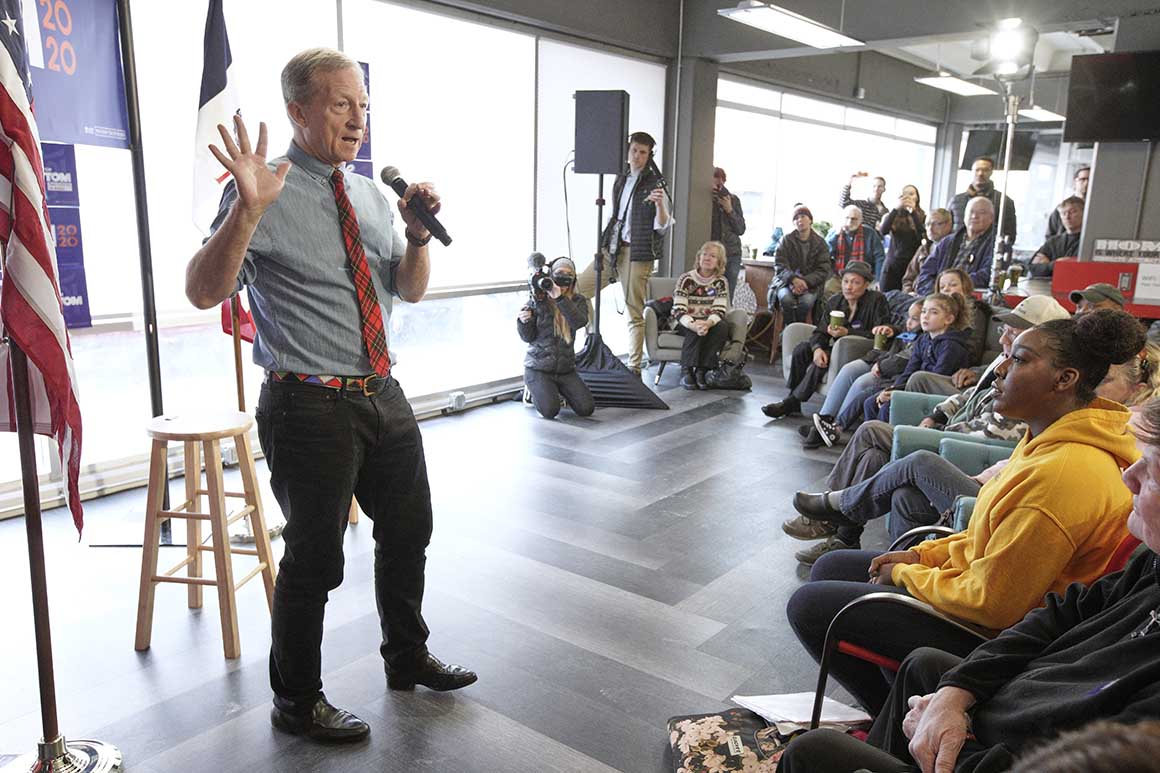
Steyer’s overall spending in the race is staggering: According to Advertising Analytics, which tracks media buys for POLITICO, Steyer has spent $135 million, most of it self-funded, on television, radio and digital ads. In South Carolina, where few other candidates have invested significant resources, Steyer has spent more than $1.2 million in Facebook ads in the past three months, on top of the $12 million on television and radio ads.
But Steyer argues that his surge isn’t only because of TV. His experience in business, he says, stands out among the other candidates, and he is building a robust field operation that eclipses his rivals.
“[President Donald] Trump’s running on the economy. I’m definitely right about that,” Steyer said in an interview with POLITICO on his campaign bus. “Whoever is going to beat him, he’s going to have to be able to take them on on that. And [Trump] has a history of beating conventional politicians on that.
“So I think people have [started to] factor in the fact that, actually, I have three decades of studying what makes for a growing, job-producing economy of economic prosperity, as well as economic justice.”
His campaign also has 82 paid staffers on the ground, which — according to a tally from The Post and Courier — is the largest team in South Carolina, and his campaign leadership says it is loaded with staffers who know the communities in which they’re working.
“Ninety percent of our staff are African American. Sixty percent of them are organizing within 20 miles of where they grew up,” said Jonathan Metcalf, Steyer’s South Carolina state director.
“His people are here working,” said Johnnie Cordero, the chair of the Democratic Black Caucus in the state, in an interview with POLITICO ahead of endorsing Steyer at a town hall in Florence. “They’re knocking on doors. They’re holding events. They’re in the rural areas. They’re all over the state. That, to me, says a lot.”
Cordero also praised Steyer for repeatedly visiting the state and talking to black residents, saying he “came here to listen.”
“They’re not just knocking on doors, but going to barber shops and places within the black community to meet with folks, and other communities as well,” echoed Bruce Ransom, the co-director of the Palmetto Poll at Clemson University. “He does have a ground game. He definitely does. He’s got a very activist organization in the state. It is not just TV and ads.”
Despite Steyer’s investment, he still trails well behind Biden, who has maintained a strong lead in public polling, built largely on his strength with African American voters, who will make up a majority in the Feb. 29 primary.
“There is one consistent in the primary: Joe Biden has been in the lead, and he is in the lead,” said Don Fowler, a former chair of both the Democratic National Committee and state Democratic Party. “He is strong because he’s been around a long time and has loyal friends in practically every element of the South Carolina Democratic Party.”
Fowler, calling Steyer a friend and “substantial person,” also said he had doubts about Steyer’s strength in the state: “ I don’t want to pour any cold water on his campaign. He’s been here a lot and bought a lot of television. So he’s got some support — but still coming in second, I think that’s a stretch.”
Steyer is also in danger of being drowned out in Iowa and New Hampshire, where he is well behind the top four candidates — Biden, Sanders, Sen. Elizabeth Warren (D-Mass.) and Pete Buttigieg — usually jockeying for a spot in the middle of the pack.
Candidates rarely recover from getting blown out of the water in the two early states. Since 1976, there’s only been one Democrat to win the nomination without carrying either Iowa or New Hampshire: Bill Clinton in 1992, when favorite son Tom Harkin won an uncontested Iowa, and Paul Tsongas won in New Hampshire.
Steyer, in an interview, said that there wasn’t any benchmark he was looking to hit in two earliest states that would make him drop out before Nevada and South Carolina. “Look, if I don’t think I can win, I’ll stop. Honestly.”
Wins in either state by Biden could solidify his frontrunner status in South Carolina. But if Biden loses the first two states, it could wound his candidacy and open the door for Steyer — unless his momentum was stopped by one of the other candidates riding a wave into Nevada and South Carolina.
“As people really turn their attention to make a serious decision, beyond a decision on name ID, that’s going to be sometime around the Iowa caucuses and New Hampshire primary,” said Hodges, the former governor. “I do think there’s a chance that other candidates can pick up, but it is likely it’ll be someone who does well in Iowa and New Hampshire.”
Source: politico.com
See more here: news365.stream






